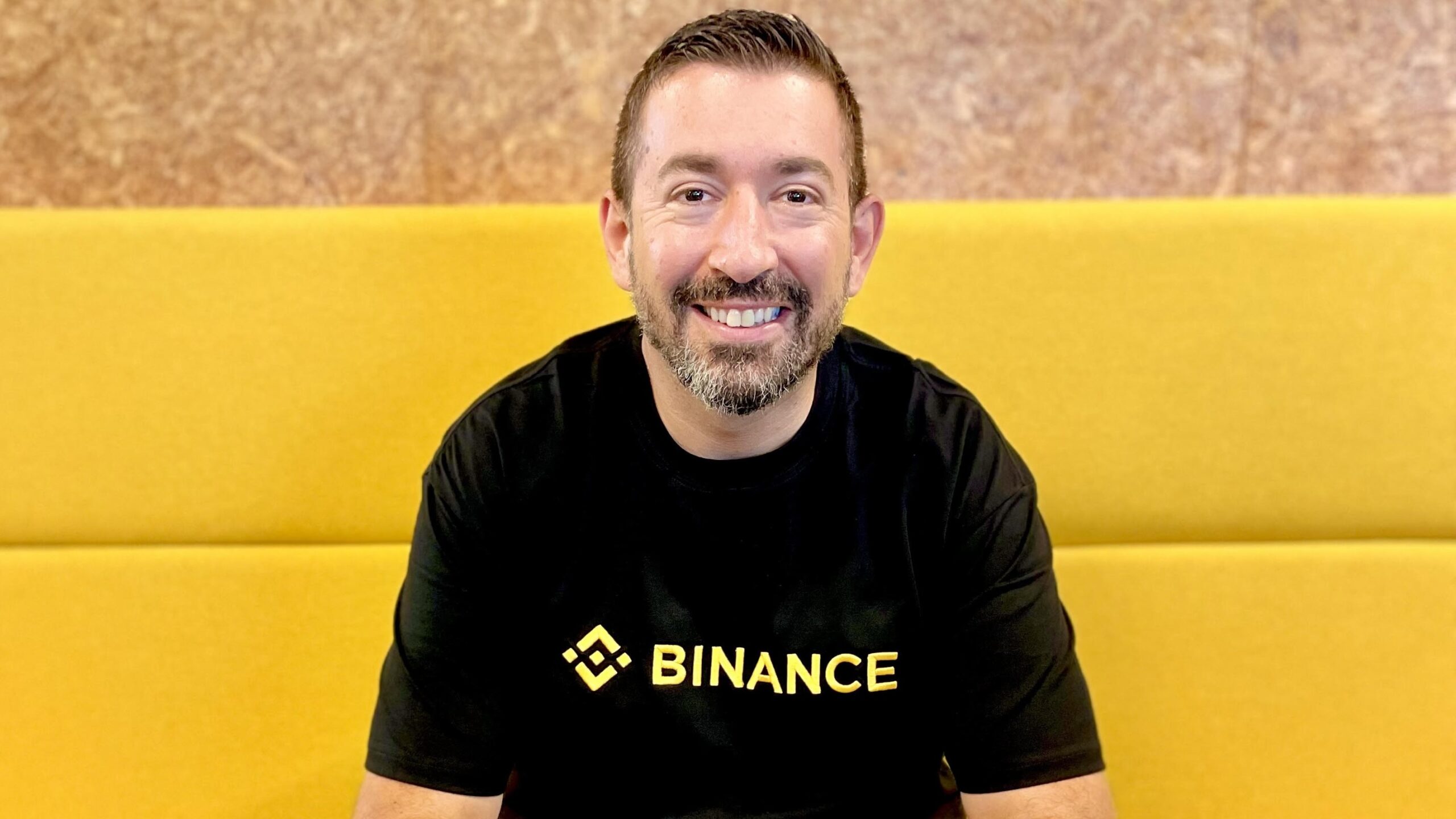Compliance and reassurance will bring another million users: Binance Australia and NZ boss

Binance Australia and New Zealand Regional General Manager Ben Rose. (Image: supplied)
The competition for crypto users is hot Down Under, and the local chapter of globally dominant exchange Binance already has a significant share.
We caught up with the new Binance Australia and New Zealand Regional General Manager, Ben Rose, to discuss his plans and vision for the firm his and outlook on crypto more broadly.
Formerly heading up operations for Binance in New Zealand, UK-born Rose recently took the reins for the exchange in both countries after the departure of former Binance Australia CEO Leigh Travers, who has moved to a role as the director of Binance Australia Derivatives.
Onboarding ‘the next million customers’
Hi, Ben. So what’s the plan? What are the goals for Binance Australia and New Zealand?
There are a number of things we’ve been focusing on. One is a move to a more regional structure – getting our 80 or so team members used to working across the region. And we’ve created some new roles to reflect that new structure, too.
And one of the key things for us is making sure we’re well positioned ahead of the next bull market, as and when that comes. We’ve got about one million Australian customers at the moment, and I want to focus on setting the team up to best be able to onboard the next million.
Crypto exchanges, very much including Binance, have seen their fair share of regulatory challenges globally, and even locally, too, would you say?
There have been and yes we’ve had a few challenges recently, in terms of compliance, so my focus really is on making sure that we’ve got the right people in the right places and have got the team focused on helping our users and our growth. And for us, that means focusing on, and growing, our spot-trading exchange.
We’ve got an exchange we’re really proud of with great product features, we’re registered with AUSTRAC locally, and now it’s time to really focus on growth mode because, like most in the industry, we’ve hunkered down during the bear market.
How do you think Binance is perceived in the local market here and in New Zealand? Globally, the organisation has come under heavy scrutiny from financial regulators, and CEO Changpeng Zhou seems to cop a fair bit of what he and others refer to as “FUD” (fear, uncertainty and doubt”), especially in the wake of the FTX exchange implosion.
Coming into my role, and spending a lot of time speaking with industry bodies and competitors and our users, my perception is that we’re looked at as the market leader globally – and that’s going to be good for some and bad for others.
I think that inevitably any global player that leads a new and evolving market is going to come under scrutiny from media and from regulators and other quarters. And that’s just part and parcel of being being at the cutting edge of financial services.
It’s an industry that hasn’t changed for years, and now all of a sudden it’s being disruprted. Some people are going to love that, and some people are going to hate that. But we see it as an opportunity.
Bolstering the team, focusing on compliance
In terms of compliance and making sure Binance Australia and New Zealand is staying on the right side of ASIC, for example – how are you approaching that?
Well we’ve had some changes in the team recently with new hires that reflect our approach and focus. And that’s to help make sure we’re getting out regional resourcing and compliance right.
Rishi Kapoor comes in as our Head of Government Affairs for the region. He’s based in Sydney and comes from a regulatory background in Australia and Hong Kong, having held senior APAC public policy positions with AFMA and ASIC.
And we’ve got Carl Chambers as our Regional Operations Strategy lead, based in New Zealand and running the original operations team there. He has crypto experience but is ex tradfi, having worked for JPMorgan, HSBC and others.
Then we’ve got Wilson Cheung, who comes into a new role at Binance as Head of Compliance for APAC. And, under him, we’ve appointed Jessica Leung as Compliance Manager. She’s come to us from ASIC and, and the ATO. We’ve got an additional compliance manager starting in a few weeks, too.
You’re clearly looking to traditional financial areas for added expertise, then…
Yeah, I suppose the point there is, as a business we’ve always been focused on evolving. We’re still a young business and we’ve always worked on reviewing our model, making sure we do it the right way.
The interesting thing about some of those hires is they come with regulatory and tradfi experience, so we’re recognising the value of that kind of background and knowledge and combining it with Binance’s DNA in crypto innovation.
Hurdles and the regulatory path
What are some of the hurdles you expect you’ll need to overcome in onboarding your “next million”?
I think crypto has got some work to do in terms of changing perceptions and building its reputation. We’ve had a pretty tough few years as an industry and so I think we’ve got to do our part in providing some reassurance to the public as well as to regulators and policymakers.
Reassurance in what way?
That we’re here for the right reasons, and we’re here to do things the right way. And that does come down to regulation.
Regulation is the way that we’re going to achieve that reassurance and mature as an industry. If you look at what’s happened recently, in Europe, they’ve announced the MiCA regulatory framework, which is a fantastic step forward as it’s a really comprehensive set of guidelines that, when it’s in place, should give users the confidence to understand who is doing things the right way, and who is not. And that’s absolutely what is required.
Where do you think we’re at with crypto regulations in Australia?
We’ve had a lot of consultations going live, a bit of a false start with the change in government, but it looks like momentum is picking up again.
We’re really excited about regulation coming in Australia, because that’s what we believe is going to help mature the industry and rid it of some of the players who aren’t necessarily interested in doing things the right way. Wheat from chaff – we’ve seen it before in other financial markets when regulation comes in.
As for where Australia is at with it all, we obviously hope it can be one of the next movers.
Yeah, it’s a shame some of the most influential regulatory bodies and elements of power at present in the US don’t seem too interested in embracing crypto and blockchain innovation – or in providing too much clarity for the industry… With that in mind, do you think Australia has a chance to become a “crypto hub” in the Pacific region then?
Yeah, absolutely. And you hit the nail on the head. It’s all about clarity. So any business in any industry needs clarity to operate successfully, as do consumers.
I mentioned Europe, and Dubai is another example – they’ve offered clarity, and they’re going to reap the benefits. I think there is absolutely an opportunity for Australia to do the same.
And, as I said before, judging by the consultations the government is running, the indication is that will come. But you know, it is about timing, too. There’s a big opportunity for Australia, but that opportunity won’t exist forever.
Aussie and Kiwi crypto trends
Are the crypto investing trends in Australia and New Zealand pretty similar from what you’re seeing? Or are there some distinct differences?
In both markets, we’ve seen a really big consolidation into Bitcoin, those who have been taking the opportunity to stack their sats. From what we’re seeing, the HODLers are there and are growing their position – that’s in both Australia and New Zealand.
One of the differences, I suppose, would be in Australia there’s a lot higher penetration of crypto, and a lot more competition, whereas in New Zealand, it’s a far more nascent market and so is slower on the adoption curve.
What excites you about crypto?
The big thing for me is the way it can and could disrupt traditional finance by letting people control their own money.
And so you’ve got an industry that has run for hundreds of years, has been highly profitable, by effectively introducing friction into the system. Crypto enables you to hold your own value, and to transfer it without anybody else getting in the way or charging you for that.
If you look at cross-border payments and remittances, for example, there are some amazing differences that can be made through crypto adoption.
It’s a phenomenal technology, I’m really excited about it, but I think we’ve got a big job to do in terms of persuading the public about its benefits, and that involves discussions with regulators and policymakers. There’s always a fear of the new, but I think the benefits are, and will be, colossal.
How do you feel about the market this year and going forward?
I don’t make predictions on future prices – there are just so many variables. But looking back, I think it’s been exciting. In the long term, I’m a believer. That’s why I’m in this.
I don’t pay too much attention day to day to the charts. But I think the long term future of crypto is so promising, and that’s why I’m involved. And Australians seem to agree with that, too, which is why the business is growing.
Related Topics
UNLOCK INSIGHTS
Discover the untold stories of emerging ASX stocks.
Daily news and expert analysis, it's free to subscribe.
By proceeding, you confirm you understand that we handle personal information in accordance with our Privacy Policy.








